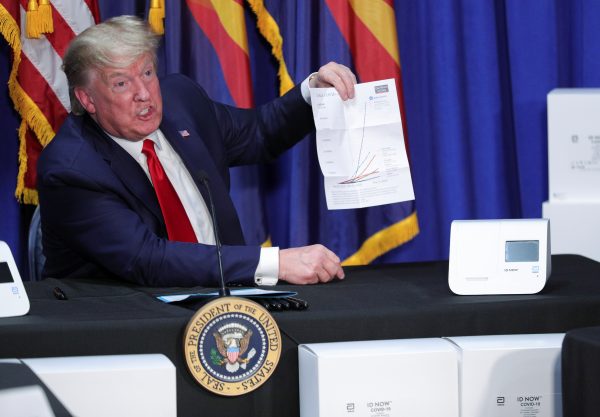Anarchy is a distinct feature of international relations. The absence of an overarching authority above states leads to self-interest as the rational behaviour for all states. COVID-19 is the apotheosis of anarchy. After the outbreak of the virus in Wuhan, the predominant reaction of the world was to distance itself from China by imposing travel restrictions and shutting down borders with China. States made self-interested actions to protect themselves from the virus, but this did not stop the eventual outbreak of a pandemic.
Distrust hinders effective cooperation among states in fighting the pandemic. China started to blame countries that restricted travel with the country, while the United States saw an opportunity to urge manufacturing industries and related businesses to withdraw from China and return home. This zero-sum mentality and self-interest-driven behaviour undermines global cooperation, even in the face of a virus that is a common ‘enemy against humanity’.
International organisations have so far failed to rise to the occasion in fighting the pandemic. The World Health Organization (WHO) has functioned as a ‘clearing house’ to offer the most authoritative information but has no power to extract information nor to enforce regulations in any country. What it can do is to issue health advice to the world based on the information voluntarily provided by member states. The anarchic nature of international politics encourages self-interested behaviour that leads to the WHO’s warnings and advice being largely ignored by many countries.
One institution that might have collective power above states is the UN Security Council (UNSC), but it has remained silent on the war against COVID-19. One possible reason is that the pandemic is not a traditional security threat that the UNSC is accustomed to dealing with. But the radio silence of the UNSC might also reflect the deep divide inside the institution itself.
The G20 appeared to carry more hope than the United Nations in coping with COVID-19 but its statement appeared only declaratory in nature. No country is stepping up to exercise much-needed leadership in the G20. To make things worse, the deepening rivalry between the United States and China has curbed concerted efforts in global governance to fight COVID-19.
Scholars and pundits have long warned that the United States and China might fall into the ‘Thucydides trap’, where an inevitable conflict might arise between a ruling power and a rising power. It seems that COVID-19 risks pushing the two countries further towards this cliff edge.
At the beginning of the outbreak in January and February, US President Donald Trump publicly praised China’s actions and the WHO’s response. But after COVID-19 hit the United States hard in March, Trump’s narrative changed to blaming China for covering up the outbreak in Wuhan in the early stages, significantly affecting the responses of other countries.
China retaliated and accused the West, especially the United States, of squandering the valuable time that China bought for the rest of the world by locking down Wuhan. The escalating war of words exchanged between the United States and China about the origins of the virus has only deepened distrust.
Global governance can only be empowered with the joint efforts of all nations of the world. The United States and China must stop the childish ‘blame game’. The intensified rivalry between the United States and China dampens global efforts to fight COVID-19 by creating unnecessary divides among nations at a time when concerted action is urgently needed. The United States and China should instead work together to form an effective global health alliance.
One possible avenue to establish a global health alliance is the UNSC. The UNSC should think beyond the box because no one can deny that COVID-19 is indeed a global security threat, though not a traditional one. The UNSC’s permanent five members (China, France, Russia, the United Kingdom and the United States) must take the lead in the global war against COVID-19. It is time for the United States and China to share global leadership within the UNSC framework in fighting this unprecedented war.
Pooling global resources to save lives, develop medicines and vaccines, and reboot the frozen global economy should be the top priorities of this new global health alliance.
No country is immune from COVID-19. Multilateralism is the only cure for this global pandemic. As French President Emmanuel Macron rightly points out, multilateralism should not be weakened by the pandemic. Instead, the UNSC, G20 and WHO should work together against the common enemy. To cease funding of the WHO during such a pandemic is nothing but a self-defeating action.
It is time for world leaders, especially President Donald Trump and President Xi Jinping, to exercise vision, wisdom and responsibility for their own countries as well as the whole world. If the United States and China can find a way to work together to strengthen global health governance and reinvigorate multilateralism, the post-COVID-19 world will be more peaceful, stable and prosperous.
Kai He is Professor of International Relations at the Griffith Asia Institute and Centre for Governance and Public Policy, Griffith University.

